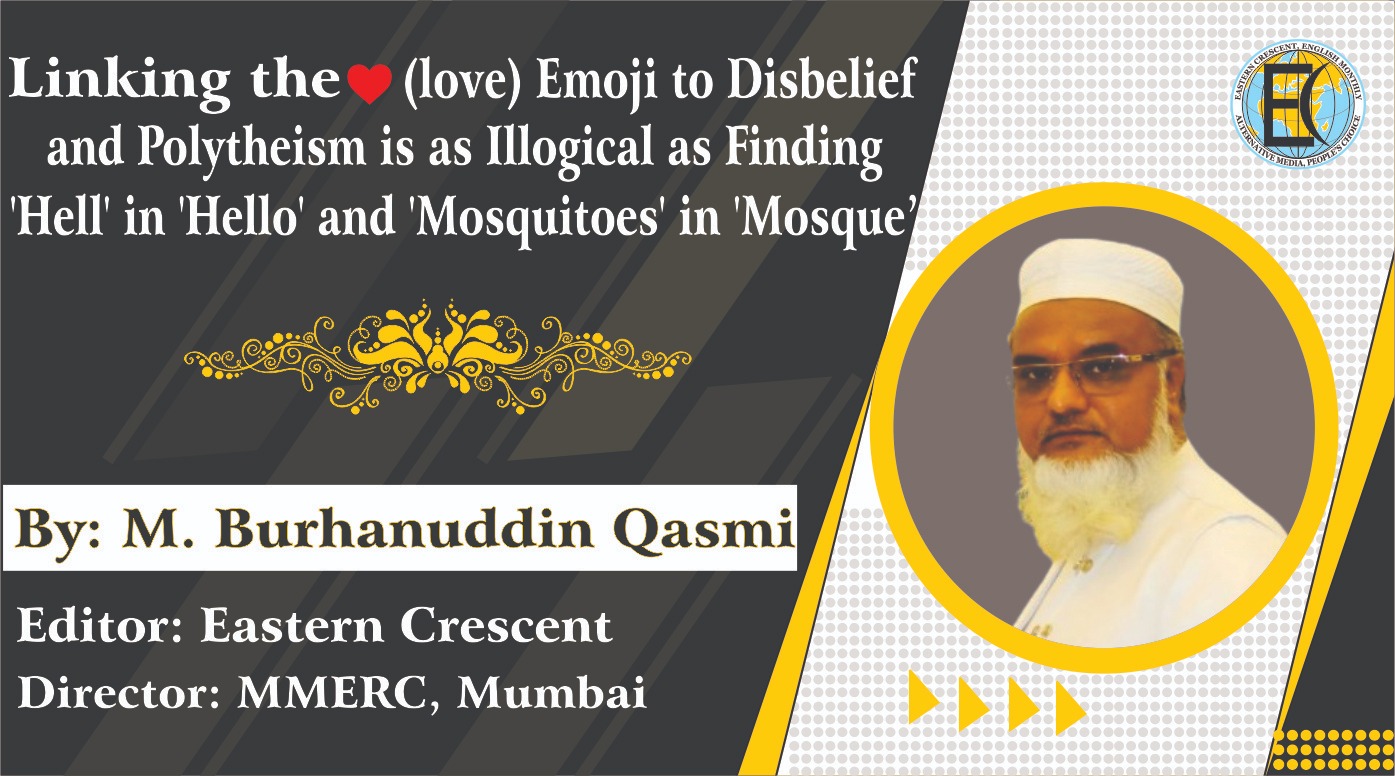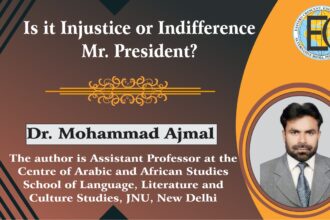Linking the ❤️ (love) Emoji to Disbelief and Polytheism is as Illogical as Finding ‘Hell’ in ‘Hello’ and ‘Mosquitoes’ in ‘Mosque’
By: M. Burhanuddin Qasmi
Editor: Eastern Crescent
A sound mind is not the name of any bird or a stone; it is an excellent human quality, and if ulama (Islamic scholars) possess it, they become even more beneficial for the community and the Nation. Software engineers, according to their consumer needs, temperaments and preferences, have created hundreds of emojis, graphics, AI images and symbols, etc., to market their products, make them popular, easy, and user friendly among people; and they will continue doing so in the future too.
Some of these IT inventions are very dear, pretty and meaningful to some users, while some others find them completely absurd, expression of vulgarity, and even uncivilized as well as irreligious; and that’s absolutely fine. That is why those engineers have invented various and numerous options so that every user can choose and use what they like.
It’s known to all consumers that one may use only those symbols that one understands and finds appealing, and avoids all those that one doesn’t understand or doesn’t like. If you don’t understand certain symbols and emojis or find their backgrounds suspicious simply don’t use them and demonstrate your wisdom – this is common sense. Young people who use these social media symbols or stickers – know their popular meanings, that’s why they use them in their regular communications.

It’s importantly noteworthy that in graphic-symbols or symbol- languages, only the meanings known to both parties – the communicator and the communicatee, are considered valid. Otherwise, the symbol will be meaningless and absurd.
Nonetheless, providing with accurate religious guidance and rational suggestions to Muslims and especially to the younger generation has always been the responsibility of the mainstream ulama of this ummah and still it is. They have been carrying their responsibilities diligently ever since the inception of Islam in this world.
However, it is worth mentioning that claims from some ulama like “the word ‘hello’ comes from the root word – ‘hell’ (hellfire) and was instrumented with telephone by the English to just curse Muslims” or that “the word ‘mosque’ is derived from ‘mosquitoes’, thus it is a derogatory term for Muslims. Linking ‘hell’ to ‘hello’ and searching out ‘mosquitoes’ in the word ‘mosque’ are just funny and laughable researches. Such a religious advice merely presents our utter ignorance which ultimately is a serious misrepresentation of universality of Islam.
Today, every young person – boy or girl – has a mobile phone in his or her hand; and any statement we present, especially if it is related to science and technology or pertains to the daily life of that young person, can be rechecked and verified with just one click. Many people do verify such statements before they put them in their practices and beliefs. Notably, not everything on the internet is correct, but not everything is wrong either. A wise person avails benefits out of correct and healthy use of latest technology, on the other hand, a wicked and fool spoils his or her life running after lust and nudity.
For any responsible individual, especially ulama, to be unaware of these facts, can be detrimental to the community wellbeing and an obstacle for the righteous ulama as a whole. Our incorrect statements, faulty researches, and undue exaggeration on day-to-day issues may erode public trust in ulama. Consequently, people may also start neglecting the right advices of firmly grounded ulama in knowledge and wisdom.
It’s unfortunate that some in our neighboring country, when they have nothing better to do, conduct hilarious “researches” about Islam and Muslim issues, and flood the inboxes of Urdu knowing readers with their findings, putting the faith of the entire ummah at risk or in doubt. This leads to endless debates on WhatsApp and Facebook, with a series of replies and counter-replies, usually ending in mutual use of bad languages, copy-pasting of old fatwas, and often without any meaningful conclusion.

Recently, I have come across one such so-called research being repeatedly shared and forwarded like wildfire on multiple WhatsApp and other social media groups. The gist of it is: “New research on stickers and emojis has come out… avoid using emojis… and the symbol of love (heart) is not permissible (in Islam)… because it represents illicit love and is a symbol of Greek gods…”
That write-up in Urdu references a fatwa from ‘Al-Lajnah ad-Da’imah lil-Ifta [20950]’, an obscure institution of the Salafi group in Saudi Arabia. It’s worth noting that a few years ago, a similar so-called research from Saudi Arabia claimed that the English word ‘hello’ is derived from ‘hell,’ and thus, a Salafi ‘mufti’ issued a fatwa prohibiting its use in casual conversation. Unfortunately, this was published by some Urdu newspapers in our neighboring country as well as in India.
In a nutshell, declaring the love symbol (heart) and other such symbols or emojis used in everyday chatting and short messaging by all people – Muslims and non-Muslims, as tools of promotion for Freemasonry, Dajjal, Sabaism, Judaism, polytheism, disbelief, and Shi’ism; thus prohibiting their use or scaring young people away from them, is akin to the baseless researches linking ‘hello’ to ‘hell,’ ‘mosque’ to ‘mosquitoes,’ or connecting the sacred name of the Prophet – ‘Muhammad’ (saws) in its English abbreviation to some wrong meaning in German language, as well as drawing conclusions of disbelief and polytheism from incorrect spellings of ‘In-Sha-Allah’ and ‘Ma-Sha-Allah’ in English. These are ridiculous claims and a mockery of true knowledge and wisdom.
The internet contains both good and bad information. Wise people benefit from the good, while the foolish destroy themselves with the bad. Much has already developed in the world of information technology, and much more is on the way. Artificial Intelligence (AI) is poised to bring about a new and significant revolution. Ulama need to get ready for the contemporary world and information technology.
It is foolish to seek exact examples of every new invention from the time of the Prophet (saws) or the early period of the rightly guided followers of Islam (Khairul Quroon). Islam values the consensus of the ulama and the analogical reasoning of those well-grounded in contemporary knowledge and wisdom. These two sources of Islam be rationally put into force and resolve new issues emerging due to modern technological development of the world.
Since 1997, this author has been fully engaged with computer, the internet, information technology, and the field of English language and literature. Coupled with the blessings of being benefited from mainstream religious education system – madrasa, I can confidently state that the claims regarding emojis, stickers and ‘hello’ are contrary to the common sense and are merely pseudo-research cloaked in Islamic garb. Ulama of the ummah should at least avoid such inappropriate preaching and teaching to at least maintain their own credibility, and instead, provide the public with appropriate and reasonable religious guidance in line with the modern age.
[The author, M. Burhanuddin Qasmi is a graduate of Darul Uloom Deoband, a writer in the English language, and the Director of the Markazul Ma’arif Education and Research Center, Mumbai.]
To read Urdu version of this article click the below link











I read this article fully, it is based on comprehensive arguments. Surely, youngsters and common people are in darkness regarding the use of emojis, it may help them to find a guidence that will light their mind and heart up.
A good article on a burning topic.